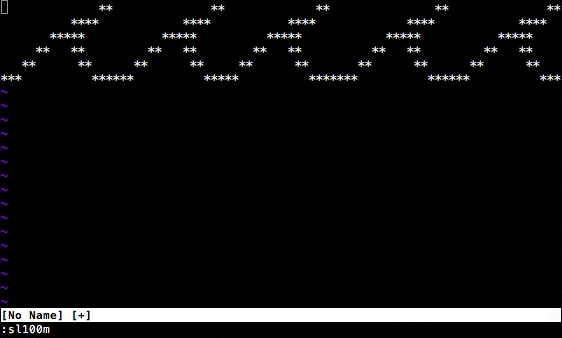46
13
Background
Summer is well over in the Northern Hemisphere, and a lot of us miss the sun, the beaches, the waves of the ocean... This challenge aims at cheering them up by reminding them of the sea.
The challenge
Here is the sea :
** ** ** ** **
**** **** **** **** ****
***** ***** ***** ***** *****
** ** ** ** ** ** ** ** ** **
** ** ** ** ** ** ** ** ** **
** ****** ****** ****** ****** ****
The sea is made of 5 times this wave pattern :
**
****
*****
** **
** **
* *****
Note that the pattern is 16 characters long, and the sea is 5 times this pattern = 80 characters long.
Which you can print into a terminal using this command-line :
perl -e 'print " ** \n **** \n ***** \n ** ** \n ** ** \n* *****\n"'
Or this one :
perl -e 'print " "x12, "*"x2, " "x2, "\n", " "x8, "*"x4, " "x4, "\n", " "x5, "*"x5, " "x6, "\n", " "x3, "*"x2, " "x3, "*"x2, " "x6, "\n", " "x1, "*"x2, " "x6, "*"x2, " "x5, "\n", "*"x1, " "x10, "*"x5, "\n"'
(The second one should make it easier for you to get the exact pattern)
Your task is to display the sea in a terminal, and make look like the waves are moving toward the right : it needs to shift to the right at a speed of 1 character each 100ms (= 10 times each seconds). No character should be printed after the 80th column, but as the rightmost wave disappears, a new one appears on the left.
Here is an example of output :
time = 0.0s
** ** ** ** **
**** **** **** **** ****
***** ***** ***** ***** *****
** ** ** ** ** ** ** ** ** **
** ** ** ** ** ** ** ** ** **
** ****** ****** ****** ****** ****
time = 0.1s
** ** ** ** **
**** **** **** **** ****
***** ***** ***** ***** *****
** ** ** ** ** ** ** ** ** **
** ** ** ** ** ** ** ** ** **
*** ****** ****** ****** ****** ***
time = 0.2s
* ** ** ** ** *
**** **** **** **** ****
***** ***** ***** ***** *****
** ** ** ** ** ** ** ** ** **
** ** ** ** ** ** ** ** ** **
**** ****** ****** ****** ****** **
time = 0.3s
** ** ** ** **
**** **** **** **** ****
***** ***** ***** ***** *****
** ** ** ** ** ** ** ** ** **
** ** ** ** ** ** ** ** ** **
***** ****** ****** ****** ****** *
time = 0.4s
** ** ** ** **
* **** **** **** **** ***
***** ***** ***** ***** *****
** ** ** ** ** ** ** ** ** **
** ** ** ** ** ** ** ** ** **
****** ****** ****** ****** ******
Of course, each output should replace the previous one.
You can run this code into a unix terminal to see how it should look with the animation:
perl -M5.010 -MTime::HiRes=sleep -E '@arr=([($")x12,($n="*")x2,($")x3],[($")x8,($n)x4,($")x4],[($")x5,($n)x5,($")x6],[($")x3,($n)x2,($")x3,($n)x2,($")x6],[($")x1,($n)x2,($")x6,($n)x2,($")x5],[($n)x1,($")x10,($n)x5]);while(++$j){for$i(0..5){for$k(0..15) {$out[$i][16*$_+$k]=$arr[$i][($k-$j)%16]for 0..4}}say"\e[H",$/,join$/,map{join"",@$_}@out;sleep 0.1}'
(Note that this code isn't very well golfed: I just made it compact enough to be convenient to run in a terminal.)
Winning criterion
This is codegolf, so shortest code in byte wins.







2Can we start the animation at any frame? – Arnauld – 2016-12-09T18:44:18.320
2http://05ab1e.tryitonline.net/#code=4oCiOCfigJNtZ2PDhMK1wqvDkuKCrMOkL-KAomJSMTbDtHZ5NcOX4oCeMDHigJ4gKuKAoX3Cuw too bad 05AB1E can't animate, that would've been short. – Magic Octopus Urn – 2016-12-09T19:01:37.210
2@Arnauld Yes, you can. – Dada – 2016-12-09T19:02:50.070
1Is it me or those waves rather look like lambdas? – Luis Mendo – 2016-12-09T19:12:56.553
1@LuisMendo I see what you mean, but lambdas point in the opposite direction, ie a reflection of the wave on the y-axis – user41805 – 2016-12-09T19:14:06.507
2
Oh, you're right! These are true lambdas
– Luis Mendo – 2016-12-09T19:16:39.99714"Summer is well over" that's very Northern Hemisphere of you. – MikeTheLiar – 2016-12-09T22:13:50.047
Is this a repost? I swear this same question was posted a while back. – haykam – 2016-12-12T02:22:28.937
@haykam Not a repost but it went through the sandbox, so I'm guessing you saw it over there. – Dada – 2016-12-12T05:49:48.460